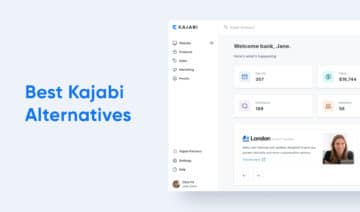If you’re thinking about kick-starting your own online business, you’re probably knee-deep in research. As a result, it’s easy to get absorbed in the ocean of tools and software geared toward eCommerce entrepreneurs. Many of these focus on website building. In contrast, others provide marketing tools, automation features, and/or help desk functionality.
In light of that, we’re exploring two tools that adopt a holistic approach to supporting online businesses: Kartra and Kajabi.
Both SaaS (Software as a Service) tools empower you to design and launch a website where you can sell your products and services. Additionally, they also come with marketing and helpdesk features.
These platforms are all-in-one, allowing you to handle your entire business from a single dashboard. That being said, there’s one significant difference between Kartra and Kajabi that we need to acknowledge before we put them against each other in a review.
Kartra allows you to sell both digital and physical products. In contrast, Kajabi is explicitly designed for entrepreneurs wanting to sell digital content and online courses. Of course, there are workarounds for selling physical products, but it could be more convenient.
Considering that, Kajabi obviously isn’t the best choice for kickstarting an eCommerce store selling physical goods. So in this review, we’ll focus on their digital sales capabilities instead.
So, without further ado, let’s look at Kartra vs Kajabi.
Kartra vs Kajabi: Key Differences and Similarities
Before we dive any deeper, let’s take a more general look at these two tools compared.
Their Differences
- Kartra is primarily a marketing platform. However, almost like an ‘afterthought,’ it also offers hosting for digital products. In contrast, Kajabi is, first and foremost, an online course platform that also lets you build websites and market your content.
- Kajabi permits you to run a blog on your website. In comparison, Kartra doesn’t offer this functionality. However, you can integrate a third-party tool, such as WordPress, which it recommends.
- Kartra comes with an inbuilt helpdesk, enabling you to install live chat on your website. Whereas, Kajabi doesn’t have a built-in help desk/chat. Instead, you’ll have to install a third-party plugin such as Live Chat to enjoy this functionality.
- Kartra has an inbuilt scheduling and calendar system, allowing you to easily book and manage appointments and showcase your availability. Kajabi doesn’t offer this feature. However, you can embed a third-party app such as Calendly to achieve similar functionality.
Their Similarities
Now, let’s see what both platforms have in common:
- Kajabi and Kartra both permit you to build and launch a website and host your content.
- They both provide intuitive drag-and-drop editors with various templates suitable for several types of web pages.
- Both platforms have marketing automation tools to help you optimize your sales and email workflows.
Now let’s take a closer look at Kajabi and Katra’s core suite of features and how they square up against one another.
Web Page Builder & Editor
As I’ve just said, both Kartra and Kajabi empower you to create your own web pages and host your content.
Kajabi
With Kajabi, you start with a website template and customize it as you see fit. There are eight themes available which dictate the overall appearance of your website. However, you can import and use your own custom themes should you wish.
You can also access what Kajabi calls its Legacy Themes. These are templates no longer being worked on by the Kajabi team. However, Kajabi will still support you with any potential issues if you use these.
It’s worth noting that each page is customizable inside Kajabi’s overarching themes. This is where Kajabi’s ‘page templates’ come into play. Kajabi provides an additional 20 pre-designed templates that enable you to customize your website and pipeline pages further. The range isn’t huge, but the templates are clean and professional-looking.
Once you’ve picked your template, you dive into the page builder. Here you can choose from over 40 site elements to help you bring your vision to life.

Kartra
In contrast, Kartra works a little differently. It doesn’t give you a selection of themes to get started with. Instead, you rely on a powerful page builder to create your website.
From there, you can choose from over 100 full-page templates to build specific web pages — your homepage, sales pages, and much more.
These design options are refreshingly varied. Once you’ve picked a template, you can edit it inside the drag-and-drop page editor.

The Winner: Kartra (Unless You Want a Blog)
When it comes to design features alone, Kartra has the upper hand. However, they don’t offer blogging functionality other than what I’ve briefly outlined above.
Whereas, Kajabi allows you to build and manage your own blog on your website. Here, you can create posts and add content, including videos. Best of all, Kajabi creates an automatic post index, which you can further customize.
Email Marketing
Both Kartra and Kajabi empower you to build and manage your email list. You can send broadcast emails, automatic responses, and automate entire email marketing workflows.
Kajabi
You can segment your audience using Kajabi’s tagging feature. This works wonders for sectioning your list into specific groups of people so that you can send them tailored content to meet their particular needs.
You can set the delivery time of your emails from your Marketing Settings. With email sequences, you can also control the days, hours, and minutes your messages are sent out before or after an event.
Kajabi also provides 19 email templates for you to choose from. Or, you can start from scratch to create something more aligned with your brand.
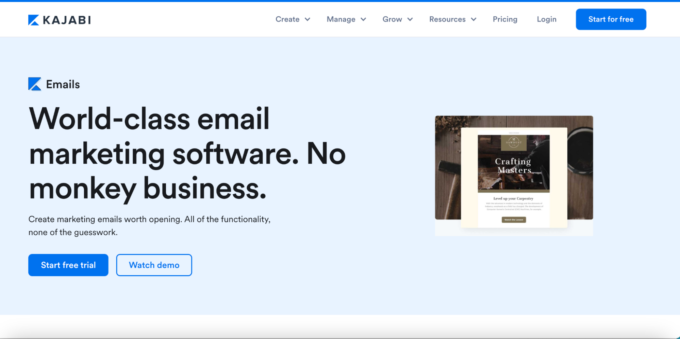
Kartra
Kartra works similarly. Still, it provides a few more features and flexibility than its competitor.
On top of that, Kartra’s split testing feature is incredibly robust. This allows you to send different emails based on various conditions to see which generates the highest open rates, sales, click-throughs, etc.
Unfortunately, Kajabi doesn’t offer a native split-testing tool. Instead, you’ll have to use their Analytics tool to monitor your email campaign’s success, which isn’t as intuitive.
Last but not least, Kartra also provides beautiful email templates. These lay the perfect foundation for professional-looking marketing comms, which you can easily customize to reflect your brand’s aesthetic.
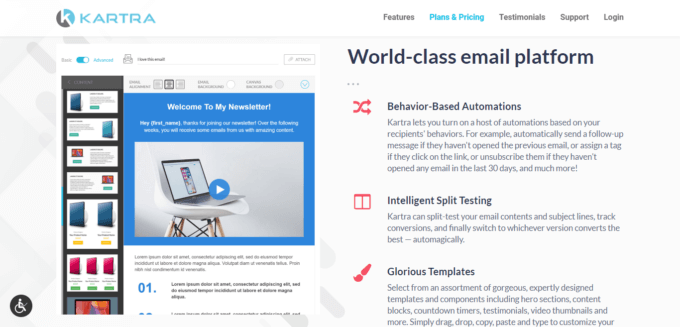
The Winner: Kartra
Although Kajabi and Kartra’s email features are somewhat similar, Kartra’s split testing functionality gives them the edge.
Sales Funnels
Now, let’s see how easy it is to build a sales funnel with either of these platforms.
Kajabi
Kajabi offers a handy sales pipeline builder. This intuitive tool empowers you to build high-converting sales funnels — and quickly.
You can choose from six pipeline blueprints to get started. Then, Kajabi creates all the necessary pages, emails, and offers for that campaign. Of course, these are all customizable, and you can add new web pages and email funnels to these pipelines as you see fit.
In other words, you can design your whole sales funnel within one builder where you can be as hands-on in its creation process as you’d like.
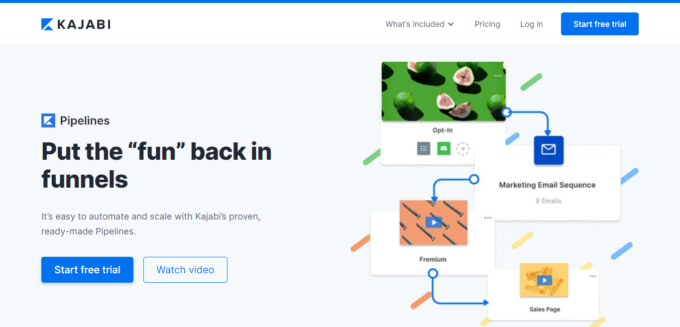
Kartra
Kartra also allows you to design and launch automated sales funnels.
With Katra, all the different elements involved in a sales funnel (opt-in forms, checkout pages, mailing sign-up, etc.) are interconnected within Kartra’s ecosystem.
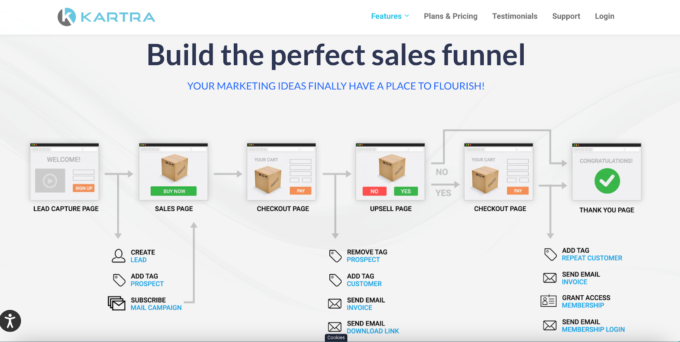
The Winner: Kajabi
Both Kajabi and Kartra offer high-converting sales pipeline capabilities. However, Kajabi’s visual editor ensures an intuitive process. Whereas, Kartra’s seems way more complicated.
Courses and Memberships
Are you going to create an online course or a digital membership area? If so, take note…
Course Builder
Kartra
As I’ve already mentioned, Kartra enables you to build courses and memberships as well as sell physical and digital products. As such, this platform’s focus is split, and this shows in its course builder.
The tool isn’t the most intuitive on the market and feels clunky in places. However, Kartra offers over 15 course-building elements, which provides a fair amount of flexibility when adding and creating your course content.
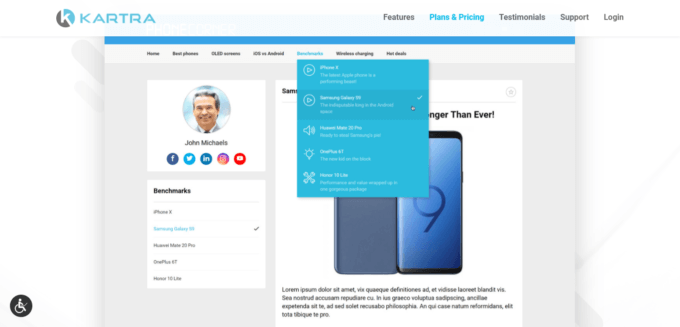
Kajabi
In comparison, Kajabi’s course builder is much easier to use. You can create a new product with just a click and quickly add lessons and modules to it. Or, use the bulk upload feature to import all your course content in one go. Then, Kajabi automatically creates a lesson for each of them.
Reordering your lessons is also a breeze, so rest assured you have complete control over your course structure.
Unfortunately, from what I can tell, this bulk import functionality is missing from Kartra.

Learning and Engagement Features
Kajabi
Kajabi offers a variety of learning and ‘student engagement’ features. For instance, you can set assessments and quizzes, establish an online community, and drip-feed/lock content as necessary.
So, if you want students to complete courses chronologically, with assessments to review their understanding, that’s possible.

Kartra
While Kartra was more limited in this regard, it now allows you to create quizzes or surveys. You can set traditional surveys, scored quizzes, and ask endless questions. Each answer and score is tracked in real-time, providing accurate audience insights.
In addition, you can also create a community space using Kartra’s Membership feature.
Lastly, both Kajabi and Kartra allow you to drip feed and lock content.
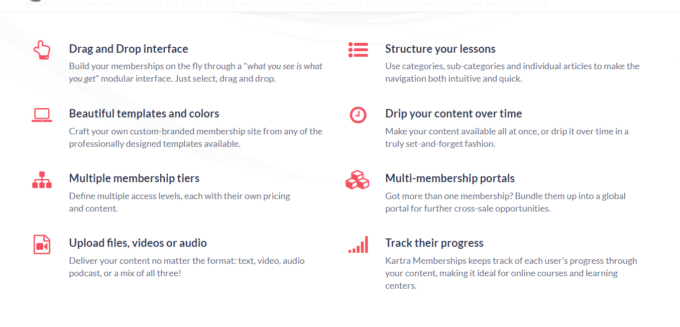
The Winner: There Isn’t a Clear Winner
Regarding courses and memberships, both Kartra and Kajabi offer these features.
However, it’s easier to navigate the Kajabi website; the Kartra website has more details about these features for you to read about without needing to sign up to explore.
Customer Service Features
Providing high-quality customer service is the lifeblood of any business, so let’s see how these platforms help you provide first-rate customer support.
Kartra
Karta comes with an inbuilt helpdesk where you can install a live chat and ticketing system on your website for visitors to contact you.
You can also easily create a knowledge base on your website. This is worth its weight in gold for encouraging your audience to pursue the ‘self-help’ route and alleviate some of the strain off your customer support team.
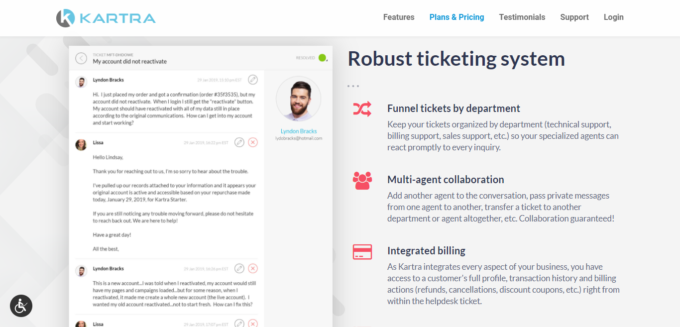
Kajabi
Kajabi doesn’t offer features like this. Instead, you have to use a third-party plugin to achieve similar functionality. However, as I’ve already hinted, with Kajabi, it’s easy to create an online community, which could also double up as a place where your audience can find customer support.
The Winner: Kartra
Kartra’s inbuilt helpdesk is a godsend for anyone looking to up their customer service game.
In contrast, with Kajabi, you must install a third-party plugin or code a solution to enjoy the same functionality.
Affiliate Marketing
You can create affiliate marketing programs with both Kartra and Kajabi. In fact, both platforms allow you to choose the products you want your affiliates to promote, generate affiliate links, and set a percentage for commissions.
It’s also easy to send announcements to all your affiliates, add new affiliates, and track the impact of your affiliate marketing program with both Kartra and Kajabi.
However, Kartra goes the extra mile by offering a few more advanced affiliate marketing features. For instance, you can enable instant PayPal payments for your affiliates, whereas, with Kajabi, affiliates wait to be paid commissions on the 25th of each month.
Kartra also allows you to set a minimum sales threshold before expenses are released. Finally, you can also collect and manage tax forms from your affiliates — handy, right?
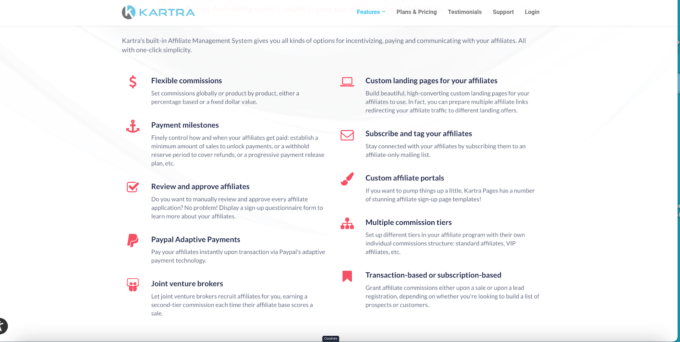
The Winner: Kartra
It’s clear that with its slightly more sophisticated affiliate marketing features, Kartra has the edge in this department.
Pricing Plans
When purchasing any piece of software for your business, pricing is always a significant priority. So, which of these online tools provides better value for money?
Let’s take a look.
Kartra
Kartra offers three payment tiers you can subscribe to. If you pay annually, you’ll enjoy a discount of 20-28% on the prices below (depending on the plan). You can cancel or switch plans at any time. Kartra also comes with a 30-day money-back guarantee if you’re dissatisfied with the software — for any reason.
There’s a free 30-day trial across all plans, but you must supply your billing details first.
Every Kartra plan includes funnels, campaigns, email marketing, video tools, and online checkout and page editor — to name a few.
Where the plans mainly differ are their upper limits:
The Starter Plan for $119 a month limits you to 2,500 leads, and you can only operate from one custom domain. You’re also limited to one language and five team members. In other words, this is plenty if you’re starting out or don’t anticipate branching out too much.
The Growth Plan for $229 a month lifts the lead limit to 12,500 and allows you to connect three custom domains. You can also add 10 team members and translate your content into unlimited languages.
You also gain access to surveys, quizzes, webinars, affiliate management, and agency features with the Growth plan. This enables agencies to help clients manage their online businesses. Agency users can access all their accounts from their Kartra dashboard.
The Professional Plan for $549 a month lifts the lead limit to 25,000 and lets you connect five custom domains and add 20 team members. It also gives you access to real-time funnel analytics and helpdesk live chat.
Suppose you’re happy with your plan, but the limits are becoming tight. In that case, you can also purchase add-ons such as additional domains or more emails and bandwidth. You can also use Kartra’s API to code custom add-ons.
Kajabi
Kajabi also offers three pricing plans. If you select their annual payment plan, you’ll save 20% on the prices below. Kajabi also offers a 14-day free trial and a 30-day money-back guarantee.
The Basic Plan starts at $149 a month and limits you to three products and three pipelines. You can nurture up to 10,000 contacts and support 1,000 active members on one website. You can also send unlimited marketing emails and landing pages.
With the Growth Plan for $199 a month, you can sell 15 products and create 15 pipelines. In addition, your contact limit is upped to 25,000; you can support 10,000 active members and register 10 admin users. You also gain access to 24/7 chat support, unlock advanced automations and affiliate marketing features, and you’ll enjoy the removal of Kajabi’s branding.
Lastly, the Pro Plan costs $399 a month. It ups your limit to 100 products, 100 pipelines, 100,000 contacts, and 20,000 active members across three websites, and you can register 25 admin users. The Pro Plan also unlocks Kajabi’s custom code editor.
The Winner: Kartra
Kartra’s starter price is lower than Kajabi’s, yet it allows you to sell more products. I like that Kartra doesn’t limit the number of products, funnels, and websites on any of its plans.
On the other hand, Kajabi’s lead limits are higher. So, if you have tons of contacts and fewer products, Kajabi might offer a more suitable plan for you. Otherwise, Kartra provides better value for money.
Customer Support
Finally, let’s see what you can expect as a customer from each platform in terms of support, including live chat, learning resources, online documentation, and more.
Kartra
You can contact Kartra’s support team via online tickets or live chat. You can access live chat support Monday to Friday, from 8 AM to 12 PM PST. You can also access ‘Kartraverse’, their online training program for helping you get the most out of your Kartra account.
It’s a playful way of putting you through training to become a ‘Kartranaut.’ You’ll find plenty of tutorials, marketing tips, and an FAQ section here. This quirky approach to online documentation is refreshing but a little harder to navigate. Luckily it comes with a site map explaining what can be found where.
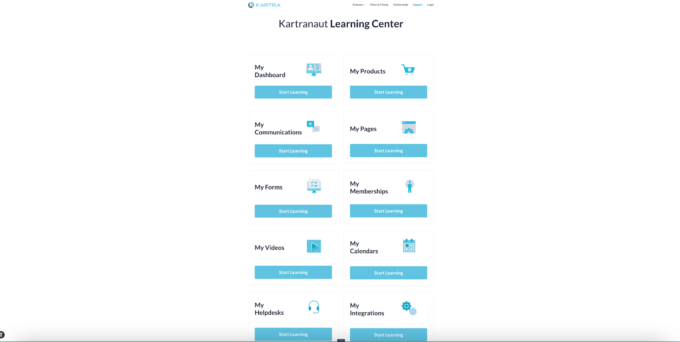
Kajabi
The level of customer support you receive from Kajabi depends on your chosen pricing tier.
On the Basic plan, you gain access to live chat support. This only becomes a 24/7 service with its Growth plan. Once you’re signed up, from the dashboard, you click the Help button, giving you access to the Help Center, email support, live chat, and live webinars.
Each plan comes with access to Kajabi University. This includes hours of training videos on using Kajabi’s tools.
There’s also a vibrant community of Kajabi users you can network with. This is a great place to find support and discuss the best strategies for marketing and using Kajabi.
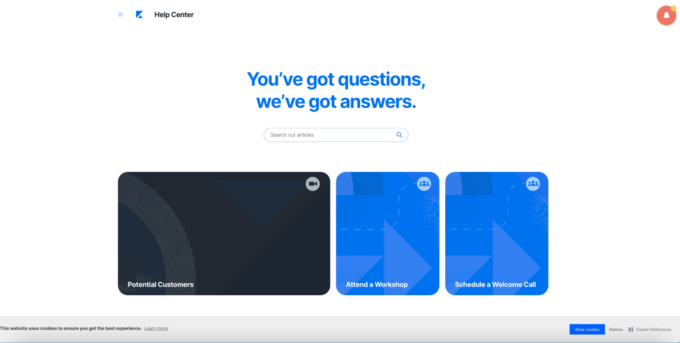
The Winner: There Isn’t a Clear Winner
In my opinion, Kartra and Kajabi offer a similar quality of customer service. However, if you’re willing to pay extra for 24/7 live chat support, Kajabi may be worth considering. If not, I’m sure you’ll be well looked after with either platform.
Kartra vs Kajabi: Pros and Cons
Before we round up this review, let’s summarize the pros and cons of both tools to give you a clearer idea of where these platforms shine and where they flop.
Kartra’s Pros
- Its inbuilt helpdesk with live chat and ticketing system empowers you to offer excellent customer service.
- Its scheduling tools make managing your time and appointments a breeze.
- Its powerful web page builder comes with varied design options.
- You can access robust email marketing tools and advanced affiliate marketing features.
- Cheaper pricing for the starter plan.
- Free 30-day trial, but you have to add billing details.
Kartra’s Cons
- There are many configuration steps for each feature; as such, Kartra has a steep learning curve that can be overwhelming for some.
- There isn’t a blogging tool; you have to integrate it with a third party.
- The website is more complex to navigate than Kajabi’s.
- It doesn’t offer 24/7 live chat support.
Kajabi’s Pros
- You can access a powerful course builder with many design options and learning tools such as assessments, surveys, and quizzes.
- Free 14-day trial, but you must add your billing details to get it.
- Kajabi comes with a blogging feature.
- There’s a visual sales pipeline editor, making it easy to create complex campaigns within one editor.
Kajabi’s Cons
- Its website builder is more limited, with less flexible themes and design options.
- There are limited helpdesk tools. You’ll need to source a third party to create a smoother customer service experience.
- You can’t sell physical products.
The Final Verdict
All this review might have shown you is that Kartra and Kajabi, while sharing many features, are quite different at their core.
It’s hard to say whether Kartra or Kajabi offers a better set of features. The truth is the two platforms excel in slightly different areas. Depending on your priorities, you might find one more suitable than the other.
Kartra‘s website builder is better overall, an excellent platform for affiliate marketing, and boasts powerful email marketing features.
If creating and selling courses isn’t a massive focus for you, Kartra offers a more versatile platform because you can sell physical and digital products and market them with Kartra’s impressive array of sales and marketing tools.
Kartra also comes with a helpdesk and scheduling tool that’s especially useful if you’re selling services or one-on-one consultancies.
However, when it comes to building sales funnels and courses or memberships, Kajabi emerges as a clear victor simply because although Kartra does have these capabilities, Kajabi is easier to navigate and feels less complex.
Not only that but if you’re primarily an online course provider selling educational video content, Kajabi is the better option for you. It’s designed with online course creation in mind, reflected in its powerful course builder.
Kajabi is also excellent if you want to manage your entire website using one platform, including blogging, marketing, and sales tasks.
Have you tried out either of these software? Tell us about your experience in the comments below.



